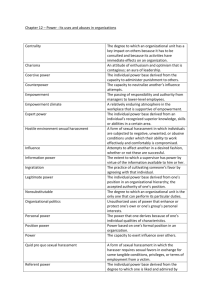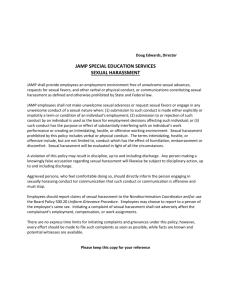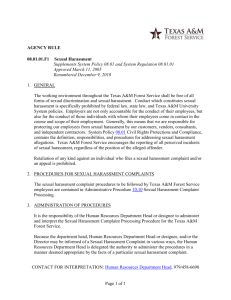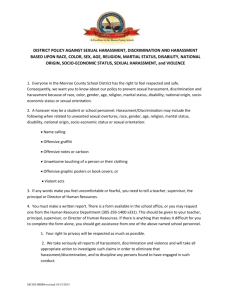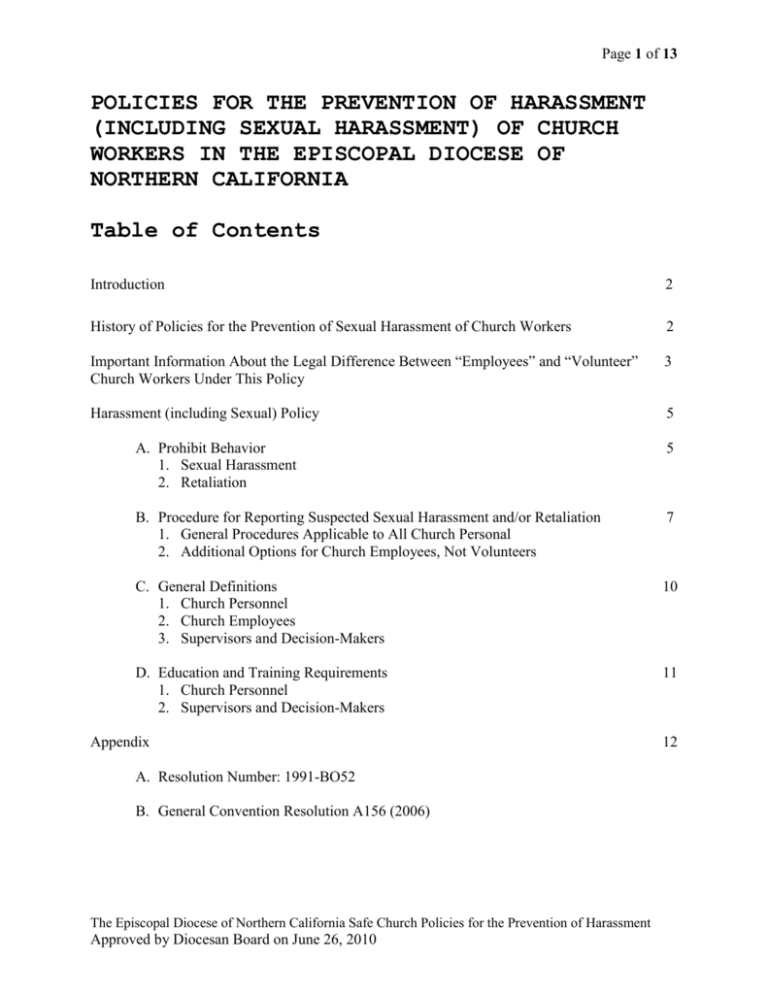
Page 1 of 13
POLICIES FOR THE PREVENTION OF HARASSMENT
(INCLUDING SEXUAL HARASSMENT) OF CHURCH
WORKERS IN THE EPISCOPAL DIOCESE OF
NORTHERN CALIFORNIA
Table of Contents
Introduction
2
History of Policies for the Prevention of Sexual Harassment of Church Workers
2
Important Information About the Legal Difference Between “Employees” and “Volunteer”
Church Workers Under This Policy
3
Harassment (including Sexual) Policy
5
A. Prohibit Behavior
1. Sexual Harassment
2. Retaliation
5
B. Procedure for Reporting Suspected Sexual Harassment and/or Retaliation
1. General Procedures Applicable to All Church Personal
2. Additional Options for Church Employees, Not Volunteers
7
C. General Definitions
1. Church Personnel
2. Church Employees
3. Supervisors and Decision-Makers
10
D. Education and Training Requirements
1. Church Personnel
2. Supervisors and Decision-Makers
11
Appendix
A. Resolution Number: 1991-BO52
B. General Convention Resolution A156 (2006)
The Episcopal Diocese of Northern California Safe Church Policies for the Prevention of Harassment
Approved by Diocesan Board on June 26, 2010
12
Page 2 of 13
Introduction
The policies contained herein are adopted as policies of the Diocese,
its institutions, its congregations, and approved organizations to
establish and maintain standards for the protection of church workers
against harassment (including sexual harassment) in order to keep all
church workers safe. Such standards are essential for establishing
parameters of propriety to guide the Church in its work.
These policies are based in part on the Model Policies for the
Prevention of Sexual Harassment of Church Workers made available by
The Church Pension Group and The Nathan Network. The Nathan Network
is a nonprofit organization dedicated to serving the Episcopal Church
by providing support for those engaged in preventing and/or responding
to sexual misconduct through training and empowerment, education,
spiritual support, resources, and networking. The Model Policies may
be viewed on the Church Pension Group website at www.cpg.org.
History of Policies for the Prevention of Harassment
(Including Sexual Harassment) of Church Workers
In 1991, General Convention passed Resolution B052 (see Appendix A) in
which it declared that sexual abuse, exploitation, coercion, and
harassment of adults and minors by clergy and church employees are
abuses of trust, a violation of the Baptismal Covenant, contrary to
Christian Character, and are therefore wrong.
In 1999, the Committee on Sexual Exploitation (COSE), also created by
General Convention in 1991, conducted a survey of 100% of the domestic
dioceses on how dioceses were dealing with issues of sexual
misconduct. COSE gathered and reviewed sexual misconduct policies from
70 dioceses with the intention of circulating as model polices those
that incorporated and reflected current best practices based on the
Church’s experience in the area of sexual misconduct during the
1990’s. COSE concluded that none of the policies gathered were truly
state-of-the-art policies that could serve as a model for dioceses who
wanted to update their current policies. In response to this need, the
Church Pension Group, in partnership with The Nathan Network,
introduced Model Policies for the Protection of Children and Youth
from Abuse in 2004.
The 2006 General Convention, in response to proposals from its Task
Force on Institutional Wellness and the Prevention of Sexual
Misconduct (the successor to COSE), adopted Resolution A156 (see
Appendix B) requiring every diocese to adopt policies to protect
church workers, both paid and volunteer, from sexual harassment and
adults from sexual exploitation. The Resolution also requires dioceses
to assist congregations in developing such policies. The Church
The Episcopal Diocese of Northern California Safe Church Policies for the Prevention of Harassment
Approved by Diocesan Board on June 26, 2010
Page 3 of 13
Pension Group and The Nathan Network developed these Model Policies
for that purpose.
This Diocese concurs with these actions of General convention and adopts this policy in response
to those actions. In addition this Diocese extends the policy beyond the sexual harassment
proscribed by secular law to include harassment of any kind for any reason, whether or not
illegal under secular law. The Diocese adopts these policies as an expression of the Baptismal
Covenants to seek and serve Christ in all persons, loving our neighbors as ourselves and to strive
for justice and peace among all people, and to respect the dignity of every human being.
Important Information about the Legal Differences between
“Harassment” and “Sexual Harassment” and “Employees” and
“Volunteer” Church Workers under These Policies
These policies extend beyond the requirements of secular law in two
respects. These policies extend to harassment of any kind for any
reason; whereas secular law protects against only harassment that is
sexual. The remedies provided by secular law to those subjected to
sexual harassment do not apply to harassment that is not sexual or, if
sexual, does not reach to the extent of the prescription of secular
law.
The second difference concerns volunteers. As of the preparation of
these policies, laws protecting workers from sexual harassment or
other harassment in the workplace only apply to “employees” and not to
“volunteers.” Federal laws provide various legal rights to employees
who have been subjected to illegal sexual harassment. Some of those
rights include: the right to file a complaint with a government
regulatory body; the right to have a government regulatory body
investigate the complaint and negotiate a remedy with the employer;
the right to have the government sue the employer on the employee’s
behalf; and the right for the employee to sue the employer for such
damages as back pay, reinstatement, lost future wages, and attorneys
fees. The rights available to employees may vary under applicable
federal, state, and local laws.
Volunteer church workers are not protected by sexual harassment laws.
However, General Convention Resolution A156 (2006) (see Appendix B)
specifically states that all church workers, both paid and volunteer,
must be protected by diocesan and congregational policies.
What this means is that both paid and volunteer workers will have the
same rights to an environment free from sexual harassment under the
organization’s policies BUT volunteer workers do not have the same
legal rights given to paid employees under federal, state and local
sexual harassment laws.
A church employer must work to prevent the sexual harassment of
volunteer workers, stop any harassment that is occurring and protect
the volunteer worker from retaliation but the volunteer worker will
The Episcopal Diocese of Northern California Safe Church Policies for the Prevention of Harassment
Approved by Diocesan Board on June 26, 2010
Page 4 of 13
not have a legal right to back pay, reinstatement, lost future wages,
attorney’s fees or any other remedy provided by law. Similarly, a
volunteer church worker does not have the legal right to file a
complaint with a government regulatory body; or to have a government
regulatory body investigate the complaint and negotiate a remedy with
the Church; or to have the government sue the Church on the
volunteer’s behalf; or have the right to sue the Church for damages
under the sexual harassment laws.
Sexual Harassment Laws
Employees covered
Yes, for some employers
Volunteers (clergy and lay) covered
No
Church Policy
Employees covered
Yes
Volunteers (clergy and lay) covered
Yes
The Episcopal Diocese of Northern California Safe Church Policies for the Prevention of Harassment
Approved by Diocesan Board on June 26, 2010
Page 5 of 13
Harassment (Including Sexual) Harassment Policy
Prohibition of Harassment (Including Sexual) Harassment
Policy
The Episcopal Church in the Diocese of Northern California (the
“Church”) prohibits harassment (including sexual) harassment of Church
Personnel1 by anyone (including supervisors or decision-makers, coworkers, consultants, vendors and other non-employees). Such
harassment (including sexual) harassment is prohibited. The behavior
of individuals engaging in such conduct, or supervisors or decisionmakers, who knowingly allow such behavior to continue, will not be
tolerated.
All church personnel, whether supervisory of non-supervisory, and
whether paid or volunteer, are prohibited from engaging in the conduct
prohibited by this policy.
A.
Prohibited Behavior
As noted above, the Church prohibits all forms of harassment
(including sexual) harassment in the Church. Specific definitions
and examples are set forth below.
1.
Harassment
The Church maintains a strict policy prohibiting harassment of any
kind for any reason. Harassment need not be illegal to be a
violation of Church policy. This prohibition applies to all
persons involved in the operation of the Church, including
supervisors and co-workers. Church personnel may not harass anyone,
and Church personnel should not tolerate harassment from anyone.
Prohibited harassment may include verbal conduct such as derogatory
remarks or bullying, visual displays such as offensive cartoons, or
other physical conduct such as unwelcome touching or impeding
movement.
2.
Sexual Harassment
Sexual harassment is prohibited by this Policy. Sexual harassment
includes unwelcome sexual advances and requests for sexual
favors. Other unwelcome conduct which may constitute sexual
harassment includes, but is not limited to, the following:
The definitions of terms used in this Policy are set forth in Section
C of this Policy.
1
The Episcopal Diocese of Northern California Safe Church Policies for the Prevention of Harassment
Approved by Diocesan Board on June 26, 2010
Page 6 of 13
Verbal:
repeated sexual innuendos, sexual epithets, derogatory slurs,
off-color jokes (for example, jokes that include sexual language,
innuendo, references, scenarios, etc.);
propositions, threats, or suggestive or insulting sounds (for
example, comments about body, sexuality, etc., including insults
and innuendo) even if the comment is about someone else;
inappropriate electronic communication (for example, e-mail,
texting, Twitter, Facebook, or any other form of electronic
communication that now exists or may come into existence, that
includes sexual jokes or other references of a sexual nature
about any person, gossip or speculation about a person’s
sexuality, sexual practices, sexual health, pregnancy, virility,
etc.). This includes e-mail or other electronic communication
that was sent accidentally, for example by hitting the “forward”
button instead of “reply,” or forgetting that a particular
individual or worker is on one of your group lists.
Visual/Non-Verbal:
derogatory posters, cartoons or drawings (for example, cartoons
and calendars that include nudity, sex acts, provocative poses,
innuendo, sexual language, etc.);
suggestive objects or pictures (for example, photographs that
include nudity, sex acts, provocative poses; wallpaper,
Screensavers, or other electronic displays of a sexual nature);
graphic commentaries; leering; or obscene gestures (for example,
vulgar gestures, gestures simulating sexual acts, “shooting the
finger,” kissing the air toward someone or licking the lips in a
sexually suggestive or provocative manner).
Physical:
Unwanted physical contacts (including touching, interference with
an individual’s normal work movement, unwelcome displays of
romantic or sexual affection, aggressive physical contact or
assault); and
Other:
Making or threatening reprisals to an individual who opposes,
objects to or complains about sexual harassment; possession of
inappropriate material of a sexual nature in the Church or its
display, duplication, or transmission.
The Episcopal Diocese of Northern California Safe Church Policies for the Prevention of Harassment
Approved by Diocesan Board on June 26, 2010
Page 7 of 13
Such verbal and physical conduct may constitute harassment when:
1. Submission to such conduct is made either explicitly or
implicitly a term or condition of an individual’s employment or
other Church work;
2. Submission to or rejection of such conduct by an individual is
used as a basis for employment or other Church work decisions
affecting such individual;
3. Such conduct has the purpose or effect of unreasonably
interfering with an individual’s work performance or creating an
intimidating, hostile or offensive working environment.
3. Retaliation
The Church will not take any action in retaliation against any
Church Personnel who, in good faith and with a genuine belief
that he/she has been harassed, brings or voices
a complaint pursuant to this Policy or otherwise opposes
harassment. In addition, the Church will not tolerate any
retaliatory acts by other individuals.
Retaliation is a serious violation of Church policy and
applicable law. If you believe you have been subjected to
retaliation in violation of this Policy, you should report your
complaint immediately in the manner specified in Section B below.
Individuals will be subject to discipline, up to and including
termination if they are found to have retaliated against an
individual because such individual (1) in good faith and with a
genuine belief that he/she has been subjected to harassment, made
an honest complaint about such conduct, (2) participated honestly
and in good faith in any investigation into a harassment
complaint, and/or (3) in good faith opposed acts of harassment.
B. Procedure for Reporting Suspected Harassment and/or
Retaliation
1. General Procedures Applicable to All Church Personnel
If you believe that the actions or words of a supervisor/manager,
co-worker, customer, vendor, volunteer, or other individual in
the Church constitutes illegal or prohibited harassment, you have
a responsibility to promptly report that behavior to the Church’s
management. Prompt reporting enables the Church to stop the
harassment, before it becomes severe or pervasive.
The Episcopal Diocese of Northern California Safe Church Policies for the Prevention of Harassment
Approved by Diocesan Board on June 26, 2010
Page 8 of 13
If you believe you have been the victim of any form of harassment
or retaliation, you must promptly give notice of your complaint
to one or more of the following:
1.
2.
3.
4.
5.
6.
Your supervisor or person responsible for your activity;
Anyone in your supervisory chain;
The rector or clergy person in charge of the congregation;
The Senior Warden of the congregation;
The Bishop; and/or
Safe Church Coordinator
You are not required to complain to your supervisor or person
responsible for your activity or within your chain of command. In
addition, to reporting the offending behavior to one of the
people listed above, you may speak directly to the individual
whose conduct you find objectionable. You are not required to do
this and it is suggested for you to consider doing only if you
are comfortable doing so. If you decide to speak directly to the
person involved, you may find that clear communication can
sometimes resolve an issue immediately, as well as build greater
understanding between individuals in the Church.
You may formally or informally complain to any of the above
personnel via any of the following:
1.
2.
3.
4.
5.
6.
7.
Telephone call
Letter
E-mail
Fax
In-person meeting
Filing a “Notice of Concern” and/or
Online through the Diocesan Website limited to e-mail access
to Safe Church Coordinator
All supervisors and decision-makers are required to report all
formal and informal complaints, as well as any suspected or known
policy violations, immediately to the rector, vicar, or clergy
person in charge of the congregation (for parishes and missions)
or Safe Church Coordinator, or bishop (for dioceses), even if you
ask the supervisor or decision-maker to keep the complaint
confidential, or indicate that you do not wish to file a formal
complaint. Church Personnel are required to report immediately
any suspected or known policy violations to the rector or clergy
person in charge of the congregation.
All supervisors and decision-makers are expected to act promptly
and appropriately to prevent (1) harassment in the Church, and
(2) retaliation against those who make a good faith complaint of
The Episcopal Diocese of Northern California Safe Church Policies for the Prevention of Harassment
Approved by Diocesan Board on June 26, 2010
Page 9 of 13
harassment, or those who participate honestly and in good faith
in either
an investigation of a complaint or oppose illegal or prohibited
harassment in the Church.
All complaints of harassment will be reviewed and investigated
promptly and impartially by the Church’s management and/or its
designee. Complaints may be made verbally or in writing. Once
Church management receives notice of any complaint of harassment
it will swiftly determine whether or not a fact-finding
investigation is necessary.
If it is determined that a fact-finding investigation is
necessary, it will be launched promptly. If necessary,
intermediate measures may be taken before completing the
investigation to ensure that further harassment does not occur.
Moreover, the Church will protect the confidentiality of the
allegations to the extent possible; however, no individual can be
promised or guaranteed strict or absolute confidentiality. For
example, information may have to be disclosed to those officials
and/or Church Personnel with a need to know in order to carry out
the purpose and intent of this Policy.
Corrective or disciplinary action will be taken against any
Church Personnel found to have engaged in harassment. Such
action may include counseling and/or appropriate disciplinary
measures, up to and including termination.
As the complaining party, you will be given notice, in a timely
fashion, of the outcome of the investigation of any formal or
informal complaint
2.
An Additional Option for Some Church Employees, Not
Volunteers, Subject to Sexual Harassment
This section provides an additional option for some Church
employees, not volunteers, who believe they have been the victim
of any form of sexual harassment, as prohibited by federal law.
(Religious associations and corporations are exempt from
California laws prohibiting sexual harassment in the workplace.)
This option is available only to employees of an employer with
fifteen or more employees.
If you are a Church employee, not a volunteer, as defined under
this Policy and you believe you have been the victim of any form
of illegal sexual harassment, in addition to the procedure set
forth above, you also have the option of consulting with an
attorney and/or filing a complaint with the Equal Employment
The Episcopal Diocese of Northern California Safe Church Policies for the Prevention of Harassment
Approved by Diocesan Board on June 26, 2010
Page 10 of 13
Opportunity Commission (EEOC), as well as pursuing any other
remedies permitted by law.
As a general matter, the time frame for filing a complaint with
the EEOC is 180 days from the date of the alleged act of unlawful
sexual harassment.
The Church employee, not volunteer, must note that these time
limits typically do not run from the date that the complaint made
to the Church is resolved but from the date the act of sexual
harassment, is alleged to have occurred. Please note that this is
not legal advice. Individual employees are responsible for
confirming the time frames for filing a complaint with these
administrative agencies by contacting the agencies themselves
and/or counsel.
Nothing in this posting or in the Church’s sexual harassment
policy creates any legal rights that did not otherwise exist nor
does the Church admit that it is covered by or subject to any
federal, state, or local laws.
C. General Definitions
1. Church Personnel
For purposes of this Policy, the term “Church Personnel” shall
mean:
a. All clergy whether stipendiary, non-stipendiary, or otherwise
who are engaged in ministry
or service to the Church;
b. All paid personnel (including Church employees) whether
employed in areas of ministry
or other kinds of services by the diocese, its congregations,
schools or other agencies.
For example, secretaries, bookkeepers, choir directors,
sextons, etc.;
c. Those who contract their services to the Diocese, its
congregations, school, or other agencies;
d. Volunteers, including any person who enters into or offers him
or herself for a Church related service, or who actually
assists with or performs a service, whether or not they have
been selected or assigned to do so. Volunteers include members
of advisory boards, vestries, bishop’s committees, boards of
directors and advisory boards, secretaries, bookkeepers,
The Episcopal Diocese of Northern California Safe Church Policies for the Prevention of Harassment
Approved by Diocesan Board on June 26, 2010
Page 11 of 13
sextons, Sunday school teachers, committee chairs and members,
altar guild members, study group members, readers, ushers,
etc.
e. All interns, persons in the ordination process, persons
serving in field education assignments,
2. Church Employees
For purposes of this Policy, the term “Church employees” shall
mean all individuals hired by the Church who are employees of the
Church for purposes of federal, state and/or local discrimination
and harassment laws
3. Supervisors and Decision-Makers
For purposes of this Policy, the term “supervisors and decisionmakers” shall mean:
a. All persons who have the express authority to hire, select,
supervise, discipline, promote, demote, terminate, set
compensation or other terms and conditions of employment;
b. All persons who have the express authority to recruit, duly
appoint, select, license, discipline, supervise, terminate, or
set terms and conditions of volunteer service;
c. All members of decision-making bodies who have the authority
to approve the creation of ministries, programs, Church
activities, or personnel policies or who [fill in examples];
d. Standing Committees, Diocesan Councils/Executive Boards,
Vestries, and Bishop’s Committees who appoint or approve
Persons Who Have Pastoral Relationships as defined in this
Policy including all Standing Committees, Commissions on
Ministry, Vestries, Boards of Directors for Schools,
Committees appointed by the Bishop and the like.
D. Education and Training Requirements
All clergy and all and all paid personnel who fall within the definition of Church Personnel and
all Supervisors and Decision Makers are required to take training on harassment and the
organization’s harassment policy. Existing Church Personnel must be trained by October 31,
2011. New Church Personnel and Supervisors and Decision Makers must be trained before they
start work in their Church position. If that is not possible, the Policy must be reviewed and
discussed with them before they start work and the training must be completed within three (3)
months of starting.
Each organization bound by these Policies shall comply with a system of record keeping,
including a centralized record repository in the Office of the Bishop, established by the Bishop,
which maintains up to date records of training, including certificates for each required training.
The Episcopal Diocese of Northern California Safe Church Policies for the Prevention of Harassment
Approved by Diocesan Board on June 26, 2010
Page 12 of 13
Appendix
A.
Resolution Number: 1991-B052
Title: Establish a Committee on Sexual Exploitation
Legislative Action Taken: Concurred As Amended
Final Text: Resolved, the House of Deputies concurring, That the 70th
General Convention of the Episcopal Church declares that sexual abuse,
exploitation, coercion, and harassment of adults and minors by clergy
and church employees are abuses of trust, a violation of the Baptismal
Covenant, contrary to Christian Character, and are therefore wrong;
and be it further
Resolved, That the 70th General Convention of the Episcopal Church
establish a Committee on Sexual Exploitation to be appointed by the
Presiding Bishop and the President of the House of Deputies to work
with the Office of Pastoral Development. It shall be the duty of the
Committee on Sexual Exploitation to study, educate, develop
curriculum, and propose policy and standards of conduct on sexual
abuse, exploitation, coercion, and harassment, and to advise the
Office of Pastoral Development as resource persons. The membership of
the committee is to be representative as to sex, race and ethnic
diversity. The Committee will report to the 71st General Convention.
Citation: General Convention, Journal of the General Convention
of...The Episcopal Church, Phoenix, 1991 (New York: General
Convention, 1992), p. 783.
The Episcopal Diocese of Northern California Safe Church Policies for the Prevention of Harassment
Approved by Diocesan Board on June 26, 2010
Page 13 of 13
B.
General Convention Resolution A156 (2006)
Final Version – Concurred
Resolution A156
Title: Sexual Exploitation
Topic: Sexual Misconduct
Committee: Social and Urban Affairs
House of Initial Action: Bishops
Proposer: Institutional Wellness and Prevention of Sexual Misconduct
Sub Committee
Resolved, That the 75th General Convention of The Episcopal Church
affirm the work already occurring in many dioceses and at the same
time recommit itself to the positions taken by previous General
Conventions that sexual misconduct (encompassing both sexual
harassment and sexual exploitation) of adults by clergy, church
employees, and volunteer workers has been and continues to be of deep
concern to this Church, is an abuse of trust, a violation of the
Baptismal Covenant, contrary to Christian character and is, therefore,
wrong; and be it further
Resolved, That each diocese adopt policies for the protection from
sexual misconduct of those served by diocesan programs, those who
volunteer in the work of the diocese or are employed by the diocese,
and that dioceses assist congregations in the development of such
procedures and policies, including using the many resources that
already exist, that address the following:
1. the articulation of behavioral standards for all clergy, lay
employees and volunteers who work with adults or who provide
pastoral counseling, pastoral care, spiritual direction, or the
sacraments;
2. a screening process for all clergy, lay employees and volunteers
who provide pastoral counseling and care, spiritual direction or
the sacraments and who supervise clergy or lay volunteers;
3. education and training for all clergy, lay employees, and
volunteers as listed above, with particular attention paid to
what legally constitutes sexual harassment and to appropriate
behavior and inappropriate sexual or sexualized behaviors towards
adults, and with periodic refresher training encouraged;
4. guidelines for responding to concerns of sexual misconduct; and
be it further
Resolved, That each diocese shall report to the House of Bishops
Committee on Pastoral Development prior to the Spring 2009 House of
Bishops meeting with a copy of its adopted and implemented policy and
an evaluation of the history of its use. A summary report shall be
made to the House of Bishops Spring 2009 meeting and a full report
made to the 76th General Convention.
The Episcopal Diocese of Northern California Safe Church Policies for the Prevention of Harassment
Approved by Diocesan Board on June 26, 2010




